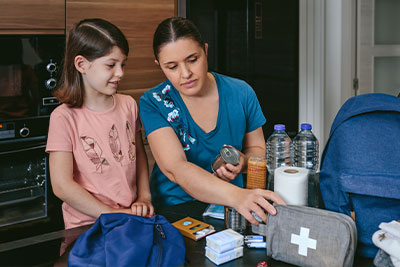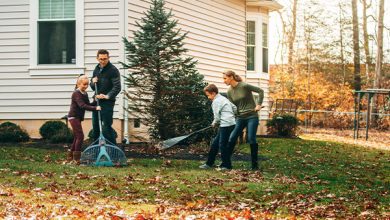Family Summer Emergency Preparedness Guide

 Summer is here! And with it comes dreams of sunny days, beach trips, and backyard BBQs. But amidst all the fun, it’s crucial to remember that summer also brings its own set of potential emergencies, from intense heatwaves and severe thunderstorms to power outages and even wildfires. These situations can arise whether you’re enjoying your usual routine at home or exploring new places on a family vacation.
Summer is here! And with it comes dreams of sunny days, beach trips, and backyard BBQs. But amidst all the fun, it’s crucial to remember that summer also brings its own set of potential emergencies, from intense heatwaves and severe thunderstorms to power outages and even wildfires. These situations can arise whether you’re enjoying your usual routine at home or exploring new places on a family vacation.
Being prepared isn’t about fear; it’s about peace of mind. By taking a few proactive steps now, you can ensure your family is ready for whatever unexpected challenges the season might throw your way, no matter where your summer adventures take you.
Build Your Summer-Ready Emergency Kit
You probably already have a basic emergency kit, but for summer, it’s wise to add some seasonal specifics. Think of it as your “grab-and-go” for unexpected situations, perfect for the car, an RV, or easily accessible at home.
Essentials to consider:
- Water, Water, Everywhere: More than usual! Summer heat increases hydration needs. Aim for at least one gallon per person per day for several days.
- Non-Perishable Food: Pack items that don’t require cooking or refrigeration, like granola bars, dried fruit, nuts, and canned goods (don’t forget a manual can opener!).
- First-Aid Kit: A comprehensive one with bandages, antiseptic wipes, pain relievers, and any necessary prescription medications. Consider adding anti-nausea medication and insect repellent.
- Sun Protection: Sunscreen (high SPF!), wide-brimmed hats, and sunglasses.
- Portable Power: A fully charged power bank for cell phones, a car charger, and a hand-crank or battery-powered radio for weather alerts.
- Lighting: Flashlights with extra batteries or headlamps.
- Cooling Supplies: Handheld fans, cooling towels, and perhaps even some instant cold packs.
- Cash: ATMs may not work during power outages or widespread emergencies, so keep a supply of small bills on hand for essential purchases.
- Important Documents: Copies of IDs, insurance policies, medical records, and emergency contacts in a waterproof bag.
- Personal Hygiene: Moist towelettes, hand sanitizer, garbage bags.
- Pet Supplies: Food, water, and any medications for your furry family members.
- Entertainment: Books, games, or puzzles for kids (and adults!) to help pass the time during an outage or evacuation.
Develop a Family Communication Plan
Knowing how to connect when separated is vital, especially when traveling in unfamiliar areas.
- Designate an Out-of-State Contact: In a widespread emergency, local phone lines might be jammed. An out-of-state relative or friend can serve as a central point of contact for family members to check in.
- Emergency Meeting Spots: Establish a few meeting places: one close to home, one outside your neighborhood, and if traveling, a designated spot at your destination (e.g., a hotel lobby, a specific landmark).
- Memorize Important Numbers: Ensure everyone, especially older children, knows key phone numbers by heart or has them written down.
Understand Common Summer Hazards & How to Respond
Different summer scenarios require different preparations. Be aware of the common hazards in your home area and any destinations you plan to visit.
- Heatwaves:
- Stay hydrated by drinking plenty of fluids (non-alcoholic, non-caffeinated).
- Limit strenuous outdoor activity during the hottest parts of the day.
- Seek air-conditioned spaces (malls, libraries, designated cooling centers).
- Never leave children or pets in a parked car, even for a few minutes.
- Recognize signs of heat-related illness (heat cramps, heat exhaustion, heatstroke) and know when to seek medical attention.
- Thunderstorms & Power Outages:
- Charge all electronic devices when storms are forecast.
- Unplug sensitive electronics during a storm to protect them from power surges.
- Keep refrigerator and freezer doors closed as much as possible to preserve food.
- Use battery-operated lights instead of candles to avoid fire hazards.
- If you have a generator, use it outdoors in a well-ventilated area, far from windows and doors, to prevent carbon monoxide poisoning.
- Wildfires (if applicable to your region or travel destination):
- If at home, create defensible space by clearing brush and dry vegetation.
- Know your evacuation routes and have a “go kit” ready.
- Monitor local alerts and news for wildfire updates and evacuation orders.
- Minimize exposure to smoke by staying indoors with windows and doors closed.
- Flooding:
- Know if your home or travel destination is in a flood-prone area.
- Have an evacuation plan and route to higher ground.
- Prepare to turn off utilities if advised by authorities.
- Never drive or walk through floodwaters. “Turn around, don’t drown.”
Practice Makes Preparedness Perfect
Discuss your family emergency plan regularly. Practice drills, even simple ones like finding your emergency kit or heading to your designated safe spot during a mock power outage. This helps everyone, especially children, feel more confident and less anxious should a real emergency occur, whether at home or on the road.
Summer should be a time for joy and relaxation, and with a little foresight, it absolutely can be. By investing a small amount of time in family emergency preparedness, you’re investing in your family’s safety and well-being. Stay safe and enjoy your summer!
Disclaimer: The information provided in this blog post is intended for general knowledge and informational purposes only, and does not constitute professional insurance advice. The content is not exhaustive and does not cover all potential situations. It is essential to review your specific insurance policy and discuss your individual circumstances with your insurance agent or broker. We strongly recommend that you consult with a qualified insurance professional to address your insurance needs and questions.
Source link



